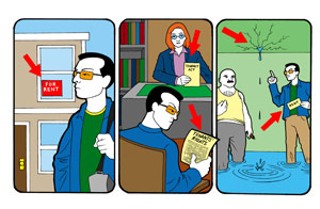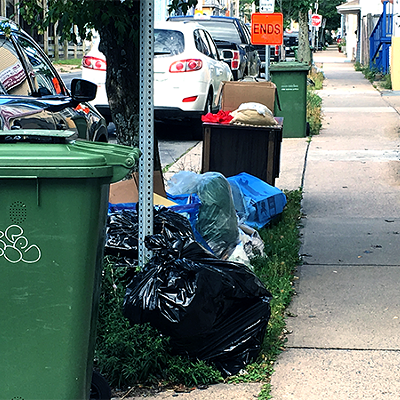"It's important for people to know what rights they don't have," Cole Webber says to me on a hot afternoon on Gottingen. It might sound like a strange perspective to have for the new coordinator of Dalhousie Legal Aid's Tenants Rights Project, but Webber says we are badly in need of an overhaul of our Residential Tenancies Act in Nova Scotia, because it tends to protect the interests of landlords over tenants.
For students coming to Halifax from out-of-province, the act has a few unpleasant surprises. First of all, Nova Scotia has no rent control. Unlike in Ontario, where the maximum rent increase is the percentage change in the Consumer Price Index plus three percent of the previous rent, and Montreal, where maximum rent increases are calculated by the Rental Board, landlords in Nova Scotia can increase the rent after 12 months by whatever amount they choose, as long as they provide sufficient notice (four months before the end of the term in an annual lease). Webber says market-dictated rent has contributed to the fast rate of gentrification in neighbourhoods like the north end. "Lots of students from low to moderate income backgrounds are suffering from the lack of rent control," he says.
Speaking of money, another thing to watch out for is security deposits. Legally, landlords are allowed to ask for a security deposit of up to half a month's rent. Under the Residential Tenancies Act, the landlord is supposed to return the security deposit---with interest---when the tenant moves out, unless they are keeping all or part of the deposit to cover the cost of repairing damages or unpaid rent. The problem is that some renters have trouble getting their security deposits back. Webber says the onus is on the renter to apply to Residential Tenancies Officers to get the deposit back from the landlord. Dalhousie Legal Aid would like to change that by having third parties hold the security deposit during a lease. As it stands, you can help protect yourself from being unfairly charged for damages by doing a thorough inspection of the apartment with your landlord at the beginning and the end of a lease.
Got a hole in your wall that isn't getting fixed? "Repairs are a big issue for everybody," Webber says. As in the security deposit, the onus is on the tenant to apply to Residential Tenancies to compel the landlord to get the repair done.
One thing Webber says you can do is to put pressure on your landlord by withholding rent. Under the tenancy act, tenants cannot be evicted until their rent is 30 days late, leaving some wiggle room for late payment. But if being 30 days late on rent is a bargaining chip for a tenant, then landlords pushing for postdated cheques takes that chip away (unless you cancel the cheque). Webber describes a tenant-friendly approach to repairs in certain US jurisdictions: "Tenancy acts empower tenants to pay for repairs that need to be done and then just deduct that from the rent," he says, "and then the onus goes to the landlord to go to Residential Tenancies to dispute that."
A few notes on coming and going: Unless the tenant has security of tenure (has rented for five years), landlords do not need a reason to not renew a lease in Nova Scotia as long as they give proper notice (in a year-long lease, three months before the end of term). If a tenant would like to end a year-long lease, they also have to give three months notice. If you are moving out early, your landlord must allow you to sublet your apartment or assign your lease to someone else, though they also have the right to meet with the new person and approve them. Webber cautions: "Landlords will sometimes try to gouge people with unreasonable subletting fees. The maximum fee a landlord can charge is $25."
Webber explains landlords tend to have more resources than tenants and are more organized politically. If all this sounds a bit discouraging, he suggests tenants in buildings and neighbourhoods should network with each other: "I think people should take to heart what rights they are lacking and get organized and active around expanding the rights that tenants have."
Dalhousie Legal Aid runs drop-in clinics for tenants, students and non-students at the Halifax North Memorial Library (2285 Gottingen, 490-5723) the first Tuesday of each month from 6-8pm. You can also pick up a Tenant Rights Guide at Legal Aid's office (2209 Gottingen, 423-8105).
The Service Nova Scotia website (gov.ns.ca/snsmr/consumer/resten/) has links to the Residential Tenancy Act and its regulations, forms including the standard lease and information about applications to Residential Tenancies Officers.
Lease laws
1. Landlords are lousy, money-grabbing scum. (No, not all of them. We kid, because we love. And we don’t want to be evicted.)
2. The rules for renting in Nova Scotia may not be what you’re used to where you come from, so check out your rights in every situation.
















